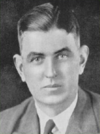Division of Deakin
| Deakin Australian House of Representatives Division | |
|---|---|
 Division of Deakin in Victoria, as of the 2022 federal election | |
| Created | 1937 |
| MP | Michael Sukkar |
| Party | Liberal |
| Namesake | Alfred Deakin |
| Electors | 112,589 (2022) |
| Area | 85 km2 (32.8 sq mi) |
| Demographic | Outer metropolitan |
The Division of Deakin is an Australian Electoral Division in Victoria.
Geography
[edit]Since 1984, federal electoral division boundaries in Australia have been determined at redistributions by a redistribution committee appointed by the Australian Electoral Commission. Redistributions occur for the boundaries of divisions in a particular state, and they occur every seven years, or sooner if a state's representation entitlement changes or when divisions of a state are malapportioned.[1]
History
[edit]
The division was created in 1937, and was named in honour of Alfred Deakin, who served as Prime Minister of Australia on three non-consecutive occasions from 1903 to 1910. Deakin had represented the Victorian federal seat of Ballarat from 1901 to 1913.
Initially a rural seat, the division has been located in the eastern suburbs of Melbourne since 1949, today taking in Bayswater North, Croydon, Croydon North, Croydon South, East Ringwood, Heatherdale, Heathmont, Kilsyth South, Mitcham, Ringwood, Vermont and Vermont South; it also covers parts of Croydon Hills, Forest Hill, Kilsyth, North Ringwood, Nunawading and Park Orchards. Vermont South includes Pin Oak Court, the cul-de-sac used as the filming location for Ramsay Street in the television soap opera Neighbours. Also part of the division's boundaries are the nearby Nunawading Studios, where other scenes for the show have been shot.[2]
Deakin has usually been held by the Liberal Party, though it became increasingly marginal from the 1980s onward. Prior to the 2013 federal election it was the second most marginal Labor Party seat in Australia. At the 2013 federal election, Michael Sukkar reclaimed the seat for the Liberal Party and was elected with 53.2% of the two-party-preferred vote.
At the time of the 2022 Australian federal election, approximately 10% of the electorate's population possessed Chinese ancestry.[3]
Members
[edit]| Image | Member | Party | Term | Notes | |
|---|---|---|---|---|---|

|
William Hutchinson (1904–1967) |
United Australia | 23 October 1937 – 21 February 1945 |
Previously held the Division of Indi. Retired | |
| Liberal | 21 February 1945 – 31 October 1949 | ||||

|
Frank Davis (1900–1980) |
10 December 1949 – 31 October 1966 |
Retired | ||

|
Alan Jarman (1923–1992) |
26 November 1966 – 5 March 1983 |
Lost seat | ||

|
John Saunderson (1948–) |
Labor | 5 March 1983 – 1 December 1984 |
Transferred to the Division of Aston | |

|
Julian Beale (1934–2021) |
Liberal | 1 December 1984 – 24 March 1990 |
Transferred to the Division of Bruce | |

|
Ken Aldred (1945–2016) |
24 March 1990 – 29 January 1996 |
Previously held the Division of Bruce. Lost preselection and retired | ||

|
Phil Barresi (1955–) |
2 March 1996 – 24 November 2007 |
Lost seat | ||

|
Mike Symon (1965–) |
Labor | 24 November 2007 – 7 September 2013 |
Lost seat | |

|
Michael Sukkar (1981–) |
Liberal | 7 September 2013 – present |
Served as minister under Morrison. Incumbent |
Election results
[edit]| Party | Candidate | Votes | % | ±% | |
|---|---|---|---|---|---|
| Liberal | Michael Sukkar | 41,626 | 41.51 | −6.21 | |
| Labor | Matt Gregg | 32,844 | 32.76 | +0.40 | |
| Greens | Rob Humphreys | 13,904 | 13.87 | +4.58 | |
| United Australia | Bianca Gidley | 2,836 | 2.83 | +0.76 | |
| One Nation | Natasha Coughlan | 2,306 | 2.30 | +2.30 | |
| Liberal Democrats | Harrison Carr | 1,843 | 1.84 | +1.84 | |
| Animal Justice | Katherine Dolheguy | 1,650 | 1.65 | −0.31 | |
| Independent | Qian Liu | 1,271 | 1.27 | +1.27 | |
| Justice | Judith Thompson | 1,080 | 1.08 | −2.23 | |
| Federation | Samantha Bastin | 909 | 0.91 | +0.91 | |
| Total formal votes | 100,269 | 95.78 | −0.15 | ||
| Informal votes | 4,419 | 4.22 | +0.15 | ||
| Turnout | 104,688 | 93.09 | −2.08 | ||
| Two-party-preferred result | |||||
| Liberal | Michael Sukkar | 50,322 | 50.19 | −4.50 | |
| Labor | Matt Gregg | 49,947 | 49.81 | +4.50 | |
| Liberal hold | Swing | −4.50 | |||

 indicates at what stage the winning candidate had over 50% of the votes and was declared the winner.
indicates at what stage the winning candidate had over 50% of the votes and was declared the winner.References
[edit]- ^ Muller, Damon (14 November 2017). "The process of federal redistributions: a quick guide". Parliament of Australia. Retrieved 19 April 2022.
- ^ "Locations". Neighbours: The Perfect Blend. Retrieved 1 August 2022.
- ^ Fang, Jason; Xing, Dong; Handley, Erin. "Chinese-Australian voters helped sway the election result. So what issues mattered most to them?". ABC News. Australian Broadcasting Corporation. Retrieved 29 June 2024.
- ^ Deakin, VIC, 2022 Tally Room, Australian Electoral Commission.
